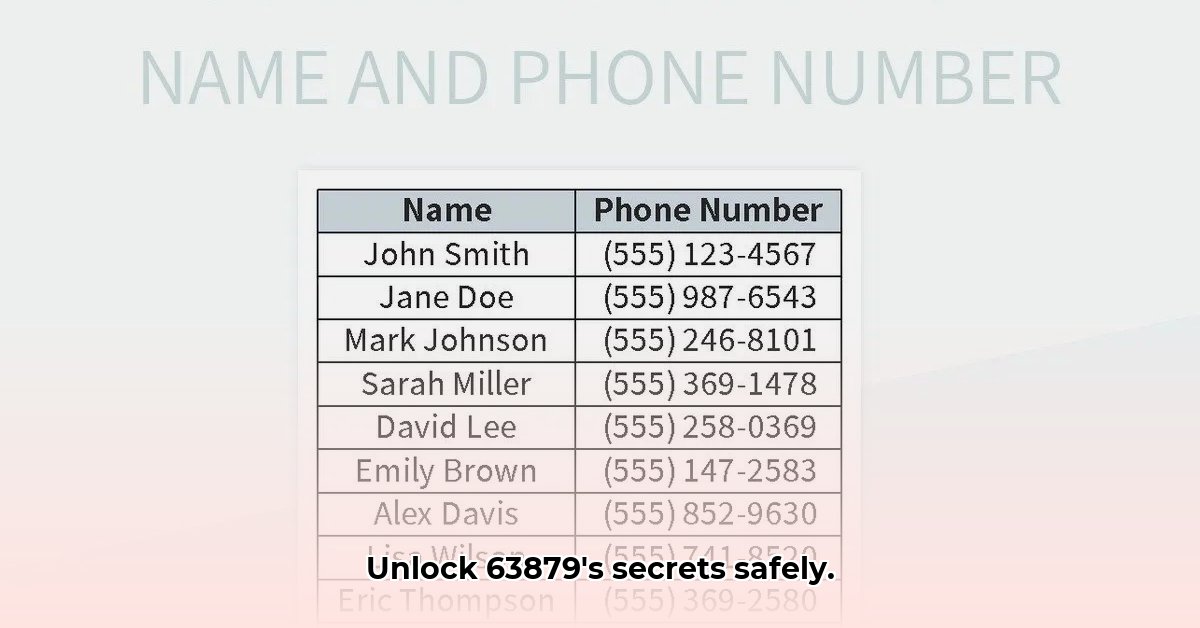
63879 Phone Number: Navigating the World of Online People Searches
The digital age has made accessing information easier than ever. A simple phone number, like 63879, can potentially unlock a surprising amount of personal data through online people search engines. But this ease of access raises critical ethical and legal questions. This article explores the capabilities and limitations of online people searches, emphasizing the importance of responsible information gathering. For more information on phone number privacy, see this helpful resource.
Uncovering Information: What's Possible with 63879?
Websites like WhitePages and USPhonebook offer potential avenues for finding information related to a phone number. Depending on the data connected to 63879, you might uncover a name, address, or links to social media profiles. However, it's crucial to understand the inherent limitations. The data may be incomplete, inaccurate, outdated, or even entirely incorrect. The information retrieved often represents a snapshot in time, potentially failing to reflect current reality. What might be revealed is a partial or complete name, an address (possibly outdated), and potentially links to online accounts. The amount of accessible information greatly varies depending on the individual's online presence and data sharing practices.
Ethical and Legal Considerations: A Delicate Balance
The ease of accessing personal information necessitates a careful examination of ethical and legal ramifications. While helpful for reconnecting with lost contacts or verifying identities, the potential for misuse is significant. This information could be exploited for stalking, harassment, or identity theft. Data privacy laws like GDPR (in Europe) and CCPA (in California) aim to protect individuals' rights, but navigating their complexities requires caution. The fundamental question remains: is the sought information truly necessary, and is the reason for the search justifiable? Careful consideration is paramount.
Accuracy and Reliability: The Importance of Verification
The accuracy of data from online people searches is often questionable. Information gathered from various sources may be inconsistent or contain errors. The inherent unreliability underscores the critical need for corroboration. Relying solely on a single source is risky. Always verify information using multiple trusted resources, including official records when available, to construct a more complete and accurate picture.
Safe Practices: Responsible Information Gathering
Responsible online people searching requires a conscientious approach. Begin with a clearly defined and ethical purpose. Access information only when genuinely necessary, treating all findings as confidential. Respect individual privacy rights; avoid sharing or misusing the gathered data. If the information seems unreliable or inaccurate, exercise caution and refrain from using it.
Legal Ramifications: Understanding Potential Consequences
Accessing personal information without consent can have serious legal consequences. Depending on the jurisdiction and specifics, this could range from significant financial penalties to criminal charges. Familiarize yourself with relevant data privacy regulations before engaging in any online search to ensure compliance with applicable laws.
Conclusion: Ethical Digital Citizenship and the Responsible Use of Data
Online people search tools offer valuable resources, but responsible use is imperative. The availability of potentially inaccurate or incomplete data, coupled with the risk of misuse, demands a cautious approach. Prioritize the privacy of others while remaining mindful of potential legal repercussions. Ethical digital citizenship necessitates treating personal information with the utmost respect. Employing caution and due diligence empowers the responsible and ethical use of these tools.
Three Pivotal Points:
- Online people search engines offer a glimpse into personal information, but accuracy is not guaranteed.
- Ethical and legal concerns are paramount; responsible use necessitates respect for privacy and compliance with relevant laws.
- Verification from multiple sources is crucial for accuracy; reliance on a single source is risky.